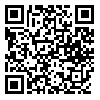Volume 20, Issue 3 (September 2022)
Iranian Rehabilitation Journal 2022, 20(3): 441-448 |
Back to browse issues page
Download citation:
BibTeX | RIS | EndNote | Medlars | ProCite | Reference Manager | RefWorks
Send citation to:



BibTeX | RIS | EndNote | Medlars | ProCite | Reference Manager | RefWorks
Send citation to:
Hoseini-Beidokhti M, Abaeian G, Abedini-Baghbadorani S, Latifi S M. Quality and Effectiveness of Virtual Education From the Viewpoint of Rehabilitation Professors and Students of Ahvaz Jundishapur University of Medical Sciences During the COVID-19 Pandemic. Iranian Rehabilitation Journal 2022; 20 (3) :441-448
URL: http://irj.uswr.ac.ir/article-1-1519-en.html
URL: http://irj.uswr.ac.ir/article-1-1519-en.html
Masoumeh Hoseini-Beidokhti1 

 , Golnoosh Abaeian *2
, Golnoosh Abaeian *2 

 , Sara Abedini-Baghbadorani3
, Sara Abedini-Baghbadorani3 

 , Seyed Mahmoud Latifi4
, Seyed Mahmoud Latifi4 




 , Golnoosh Abaeian *2
, Golnoosh Abaeian *2 

 , Sara Abedini-Baghbadorani3
, Sara Abedini-Baghbadorani3 

 , Seyed Mahmoud Latifi4
, Seyed Mahmoud Latifi4 


1- Musculoskeletal Rehabilitation Research Center, Ahvaz Jundishapur University of Medical Sciences, Ahvaz, Iran.
2- Student Research Committee, Ahvaz Jundishapur University of Medical Sciences, Ahvaz, Iran.
3- Ahvaz Jundishapur University of Medical Sciences, Ahvaz, Iran.
4- Diabetes Research Center, Ahvaz Jundishapur University of Medical Sciences, Ahvaz, Iran.
2- Student Research Committee, Ahvaz Jundishapur University of Medical Sciences, Ahvaz, Iran.
3- Ahvaz Jundishapur University of Medical Sciences, Ahvaz, Iran.
4- Diabetes Research Center, Ahvaz Jundishapur University of Medical Sciences, Ahvaz, Iran.
Abstract: (2948 Views)
Objectives: The emergence of COVID-19 and its prevalence in the global community had various economic, social, emotional, psychological, and educational impacts. The closure of schools and universities in the country because of the outbreak of COVID-19 has led to the emergence of e-Learning in education at all levels. Given the importance of virtual education during the pandemic and the need to improve its quality at schools and universities, this study aims to explore the quality, efficacy, and understanding of the strengths and drawbacks of virtual education from the perspectives of professors and students at Ahvaz Jondishapur University of Medical Sciences.
Methods: In the domains of physiotherapy, occupational therapy, speech therapy, and audiology, the current descriptive-analytical study was done with 17 professors and 210 undergraduate and postgraduate (master’s degree) students. The data was collected using the Persian version of the Watkins e-learning standard questionnaire and was analyzed via the SPSS software, v. 26.
Results: From the professors’ perspective, the quality and effectiveness of virtual education based on different components of the questionnaire did not differ significantly and all dimensions were considered effective. However, the students considered the dimensions of technology access and online skills and relationships as strengths and faced challenges in the importance of success.
Discussion: Considering the identified strengths and challenges, it seems that policymakers in the field of education should pay special attention to providing the necessary conditions and facilities to improve the quality of learners’ virtual education.
Methods: In the domains of physiotherapy, occupational therapy, speech therapy, and audiology, the current descriptive-analytical study was done with 17 professors and 210 undergraduate and postgraduate (master’s degree) students. The data was collected using the Persian version of the Watkins e-learning standard questionnaire and was analyzed via the SPSS software, v. 26.
Results: From the professors’ perspective, the quality and effectiveness of virtual education based on different components of the questionnaire did not differ significantly and all dimensions were considered effective. However, the students considered the dimensions of technology access and online skills and relationships as strengths and faced challenges in the importance of success.
Discussion: Considering the identified strengths and challenges, it seems that policymakers in the field of education should pay special attention to providing the necessary conditions and facilities to improve the quality of learners’ virtual education.
Keywords: e-learning, Virtual education, Quality of e-Learning, Effectiveness of virtual education, Rehabilitation
Article type: Original Research Articles |
Subject:
Speech therapy
Received: 2021/11/18 | Accepted: 2022/01/8 | Published: 2022/09/19
Received: 2021/11/18 | Accepted: 2022/01/8 | Published: 2022/09/19
Send email to the article author





